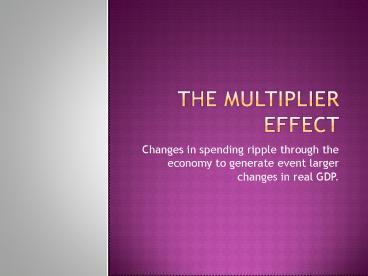The Multiplier Effect - PowerPoint PPT Presentation
1 / 12
Title:
The Multiplier Effect
Description:
Changes in spending ripple through the economy to generate event larger changes in real GDP. ... Alternatively, it can be rearranged to read... Art Buchwald ... – PowerPoint PPT presentation
Number of Views:2421
Avg rating:3.0/5.0
Title: The Multiplier Effect
1
The Multiplier Effect
- Changes in spending ripple through the economy to
generate event larger changes in real GDP.
2
Why?
3
The dreaded equations
- Multiplier change in real GDP / initial change
in spending. - Alternatively, it can be rearranged to read
- Change in real GDP initial change in spending
x multiplier.
4
Three points to remember about the multiplier
- The initial change in spending is usually
associated with investment because it is so
volatile. - The initial change refers to an upshift or
downshift in the aggregate expenditures schedule
due to a change in one of its components, like
investment. - The multiplier works in both directions (up or
down).
5
The multiplier is based on two facts. (1)
- The economy has continuous flows of expenditures
and incomea ripple effectin which income
received by Grant comes from money spent by
Battaglia. Battaglias income, in turn, came
from money spent by Mendoza, and so forth.
6
The multiplier is based on two facts. (2)
- Any change in income will cause both consumption
and saving to vary in the same direction as the
initial change in income, and by a fraction of
that change. - a. The fraction of the change in income that is
spent is called the marginal propensity to
consume (MPC). - b. The fraction of the change in income that is
saved is called the marginal propensity to save
(MPS). - c. This is illustrated in Table 9-3, and Figure
9-8 that is derived from the Table. (next slide)
7
- a. The fraction of the change in income that is
spent is called the marginal propensity to
consume (MPC). - b. The fraction of the change in income that is
saved is called the marginal propensity to save
(MPS). - c. This is illustrated in Table 9-3, and Figure
9-8 that is derived from the Table.
8
MPC and sizeInverse relationship
- The size of the MPC and the multiplier are
directly related the size of the MPS and the
multiplier are inversely related. - See Figure 9-9 for an illustration of this point.
- In equation form Multiplier 1/MPS or
1/(1-MPC).
9
Final Word
- The significance of the multiplier is that a
small change in investment plans or
consumption-saving plans can trigger a much
larger change in the equilibrium level of GDP.
10
LAST WORD Squaring the Economic Circle
- Art Buchwald
11
Squaring the Economic Circle
- Hofberger, a Chevy salesman in Tomcat, Va.,
called up Littleton of Littleton Menswear
Haberdashery, and told him that a new Nova had
been set aside for Littleton and his wife. - Littleton said he was sorry, but he couldnt buy
a car because he and Mrs. Littleton were getting
a divorce. - Soon afterward, Bedcheck the painter called
Hofberger to ask when to begin painting the
Hofbergers home. Hofberger said he couldnt,
because Littleton was getting a divorce, not
buying a new car, and, therefore, Hofberger could
not afford to paint his house. - When Bedcheck went home that evening, he told his
wife to return their new television set to
Gladstones TV store. When she returned it the
next day, Gladstone immediately called his travel
agent and canceled his trip. He said he couldnt
go because Bedcheck returned the TV set because
Hofberger didnt sell a car to Littleton because
Littletons are divorcing.
12
Squaring the Economic Circle
- Sandstorm, the travel agent, tore up Gladstones
plane tickets, and immediately called his banker,
Gripsholm, to tell him that he couldnt pay back
his loan that month. - When Rudemaker came to the bank to borrow money
for a new kitchen for his restaurant, the banker
told him that he had no money to lend because
Sandstorm had not repaid his loan yet. - Rudemaker called his contractor, Eagleton, who
had to lay off eight men. - Meanwhile, General Motors announced it would give
a rebate on its new models. Hofberger called
Littleton to tell him that he could probably
afford a car even with the divorce. Littleton
said that he and his wife had made up and were
not divorcing. However, his business was so
lousy that he couldnt afford a car now. His
regular customers, Bedcheck, Gladstone,
Sandstorm, Gripsholm, Rudemaker, and Eagleton had
not been in for over a month!































